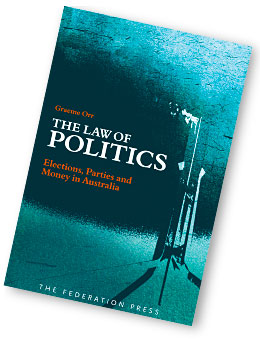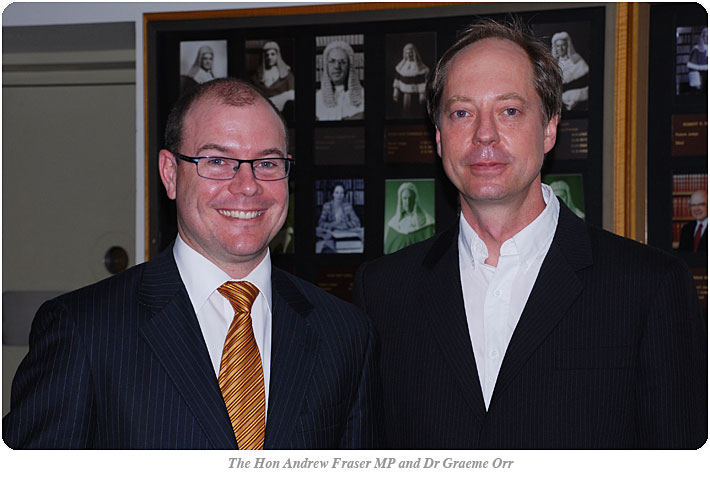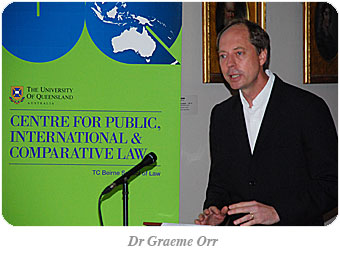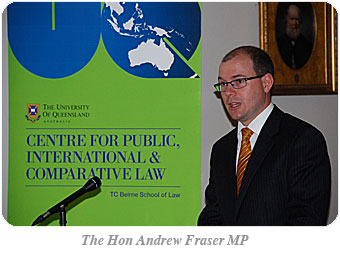Launch of “The Law of Politics” – Speeches delivered by the Hon Andrew Fraser MP and Graeme Orr
Address by the Hon Andrew Fraser MP
“That politics is governed by law may come as a surprise.”
This entry point into Graeme Orr’s tome observes the maxim, “start as you mean to continue.”
Few would consider a book on matters pertaining to the legalities the franchise, the interplay of privacy with enrolment, public funding, courts of disputed returns, political parties and anti-discrimination law would be a pulp fiction page turner.
However this book is of course peppered with Graeme’s elegant use of language and engaging vocabulary — the watery conclusion to the chapter on political finance reform is both insightful and delightful to read.
 My own copy was recommended to me with the author’s inscription, “May you never fall foul of it.”
My own copy was recommended to me with the author’s inscription, “May you never fall foul of it.”
This generosity of sentiment is rarely offered to, and less rarely received by, the combatants in the theatre of modern politics.
In the watery conclusion of Chapter 9 which deals in part with campaign finance reform was a passage that caught my eye, indeed my hopes.
Few if any politicians enter politics with money on their minds.
A rarely stated view despite its obvious truth to those who know the individuals occupying a parliament — my view here applies across the chamber and across the political spectrum.
But the incisive analysis continues, crushingly:
On the contrary: they are activated by a mix of ideology, public spiritedness and ego.
Fortunately I can report that my public spiritedness survived this bashing.
The law of politics does matter — it is fundamental to the vital functioning of our society. The rhythms and rituals of elections aggregate our views to enable functioning government.
We have seen of course that the nation has become almost incapable but perhaps unwilling to decisively elect one side or another to a clear majority in the lower houses of Australia from which governments are formed.
It has been suggested this week that it is an increasingly cantankerous electorate is just determined to turf out governments is responsible. “It’s time” has gone from being an inspiring call to action, to a content-free excuse to switch sides.
In the book, Graeme offers the view that an absence of unhappiness might be another explanation — our peaceful and harmonious history has not produced the sort of visceral debates that otherwise inform public discourses. He suggests: “Ideological convergence around a form of government managerialism focused on the middle class has increasingly become a feature of post-war politics.”
We have much to be proud of as a nation — we lead the way in promoting an egalitarian franchise. With our brothers from across the ditch, we showed the way to giving the sisters an equal say. Of course it took much longer, regrettably and shamefully, for us to extend the same essential acknowledgment of inclusion to indigenous Australians.
The secret ballot is in some circles known as the Australian ballot — Les Murray’s reference to the ‘closet of prayer’ is mentioned in the book.
That familiar cardboard stand, with mandated pencil, is the temple of our democracy.
Graeme notes that judges and academics have not dwelled upon the law of politics and ventured into its rich possibilities. We seem, like so much of our democracy, to take it for granted.
He rushes to say that it would be a conceit to place this book, in the absence of others, on a pedestal.
It is not. It’s instead a poor reflection on us, and a grand reflection on Graeme that this book is being launched here tonight can perhaps already be regarded as a seminal work.
the Hon Andrew Fraser MP

 Address by Graeme Orr
Address by Graeme Orr
Thank you Treasurer. Asking Andrew Fraser to launch this book was a personal, not a partisan, gesture. In the 13 years I taught law at Griffith University, Andrew was by far the best public policy and law graduate we had. There were efforts to secure him a Rhodes Scholarship: but, well … sorry, Andrew, you went to the wrong law school!
I also well recall sitting on a bus, marking a project he’d undertaken. It was a brilliant essay: I was still marking it on the bus on the way home. (Not the ideal venue for such work, but the bumpy ride didn’t matter. Hardly a word or concept needed comment, let alone correction.) The essay was on an important but neglected area: the role of the opposition in a Westminster democracy. If the polls continue their current trajectory, Andrew, you may have to dig it out … if you can find a computer that still reads floppy disks!
My interest in the ebb and flow, and rules and chaos of electoral politics was sown very young. A very early memory was seeing a blue Liberal how to vote card, and liking it. Not so much because of Billy McMahon’s comic looks, but because it was blue like my footy team, Past Brothers RLFC. Not long after, however, I asked my mum: ‘Is it fair that the blue and green sides get to gang up on the lone red team?’
Like many of you, I well remember Nov 11, 1975. It was a sultry day and I returned from Petrie Terrace primary school to find my Cray-Pas had melted on the verandah, and my mum in tears. Naively, I tried to console her with ‘It’s alright, we can always get some more crayons’! My parents were a rare breed, small business people who thought well of Gough Whitlam, mostly because of his policies on education. I benefited immensely from that emphasis on education, and I’m very glad my dad can be here tonight – as the book is dedicated to you and Helene.
Unfortunately, another recent octogenarian has had to send his apologies. Colin Hughes, long time Professor of Government at UQ has been the doyen of electoral scholars for decades, as well as a reforming head of the Australian Electoral Commission in the 1980s. To this day, as an Emeritus Professor, he contributes regularly through submissions and research. Colin wrote an inimitable, potted history which is the foreword to the book, but alas age has curtailed his ability to make and endure events like this.
Books like this would ordinarily be launched in Canberra or Sydney. But I’m very happy it’s launching in Queensland. This state has more than left its mark on the law of politics. Not least through decisions in this precinct. In this building, Justice Dowsett modernised the law of political parties, in the case of Baldwin v Everingham. Bypassing the High Court’s decision in Cameron v Hogan, Dowsett J has permitted party pre-selections and other internal stoushes to become justiciable. It is a ruling which the parties have accepted with equanimity.
Also in this building, Justice Atkinson deregistered the One Nation party because of its furtively byzantine structure, in Sharples v O’Shea. I worked pro bono on that case, and it was a rare victory for a litigant in person (a breed that is far from rare in this area of law). That case led to Pauline Hanson being charged with criminal offences — unfairly, I thought, since registering One Nation wasn’t really an impost on the public funding system, since there were tens of thousands of one nation devotees. The fraud, if anything, was on those supporters who thought they were joining a properly structured party. Judge Patsy Wolfe, who is also here, had to preside over the sentencing — but the Court of Appeal later exonerated Ms Hanson. To this day, instead of a single notion of membership of a political party, we have two competing common law ideas, and that takes up a couple of pages of the book.
Yesterday was the 35th anniversary of the High Court denying that 1v-1v was a part of our Constitution. That was in McKinlay’s case. Bill Pincus will feel weary with that reminder, but as a young QC, three and a half decades ago, he argued the side of the angels from Queensland in that case. And the case has sown a significant seed: in the past 4 years the High Court has twice revisited it to imply a presumption of a universal franchise.
Queensland’s various contributions to the annals of the law of politics are rich indeed. Some retrograde, some positive:
- On the plus side is the contingent vote, which Queensland had from 1892 to 1942 and which the Fitzgerald process rediscovered in 1992. We now know it today as ‘optional preferential voting’. (I’m afraid to say that some of Andrew’s colleagues are toying with dumping optional preferences for 2012).
- On the downside, under several strongmen Premiers we had a notorious rural malapportionment: though not the worst, because South and Western Australia share that title.
- And, on through the Shepherdson inquiry into false enrolments to rort ALP pre-selections …
All this and more is raked over in the book.
The book is a heavy duty legal tome, although I’ve leavened with political context and examples and comparative law and law reform debates. At least the publishers must think so, since they’ve priced it like a heavy duty reference work! I do hope it is more readable than your typical legal tome.
As I explain in the first chapter, there are two standard views of regulating politics. The more cynical is that politics is just an elite game, and the focus is on reining in the worst excesses of Andrew’s friends and foes, and aiming for a reasonably level playing field. The second view is a more romantic and liberal view. It sees the law as a key to enabling deliberative democracy, participatory campaigns and a goldilocks balance between political liberty and equality. Between the sporting metaphor, and the liberal enlightenment, I think there is a third way we can look at the field. We can see electoral institutions and norms as structuring a ritual through which citizens experience politics. Just think how polling day, that One Day Every Three Years, acts as a uniquely curious moment of unification. Think of how our electoral laws and Commissions send us back to schools, to enact one of the few binding moments our society offers. Even using schools is a neat trick since, alongside taxation, compulsory voting and compulsory education form the three inescapable and interwoven, benefits and burdens of a shared, public life.
Our electoral experience would be quite different if the law ever moves to all postal voting, as has been trialled in parts of the UK and US. Or if we scurried to vote before or after working hours as they must do in those countries, rather than voting on Saturday as the law has long prescribed here. Some of the earliest legislative debates in the 1900s in Australia were about whether to permit voting in licensed hotels. After all, in most towns, pubs were literally the only public buildings. Others feared that voting in pubs would be unfair on the newly enfranchised fairer sex, literally so as only white women were enfranchised then. In a very Australian way, the compromise was struck that pubs could house polling booths, but only in unlicensed sections.
Soon enough we will be having legislative debates about voting from home, via a passing transaction on the internet. If so called ‘e-voting’ comes to pass, what will become of the ritual of polling day – let alone election night parties — with the count potentially being known within minutes? What, more significantly, will become of the idea of a campaign period, which builds to a peak just before the three day repose of the advertising blackout, if people will be free to vote at their leisure anytime after rolls close?
As far as I know, this book if the first of its kind to map and chronicle the law in this area for a century. Back then, challenging election outcomes with court petitions was a common response to both corruption and sour grapes. I cannot promise the barristers here a return to that nirvana of electoral petitioning. Our electoral Commissions are just far too independent and our parties too professional for that. But, as we’ve seen in recent years, there has been some movement in constitutional litigation, particularly rumblings in the High Court that it will no longer trust the law of politics to pure parliamentary sovereignty; for that may be too much like leaving the kids in charge of the lolly cabinet.
What I can promise you is some sweetly fermented grapes, in the foyer outside. Before that I must acknowledge the research assistance supported by the Law Foundation of South Australia, and the contribution of the Centre for Public, International and Comparative Law at the UQ Law School, which helped us put on the launch and the all important refreshments. To which, we should now adjourn.
Dr Graeme Orr, Associate Professor, UQ Law School




 My own copy was recommended to me with the author’s inscription, “May you never fall foul of it.”
My own copy was recommended to me with the author’s inscription, “May you never fall foul of it.” 
 Address by Graeme Orr
Address by Graeme Orr